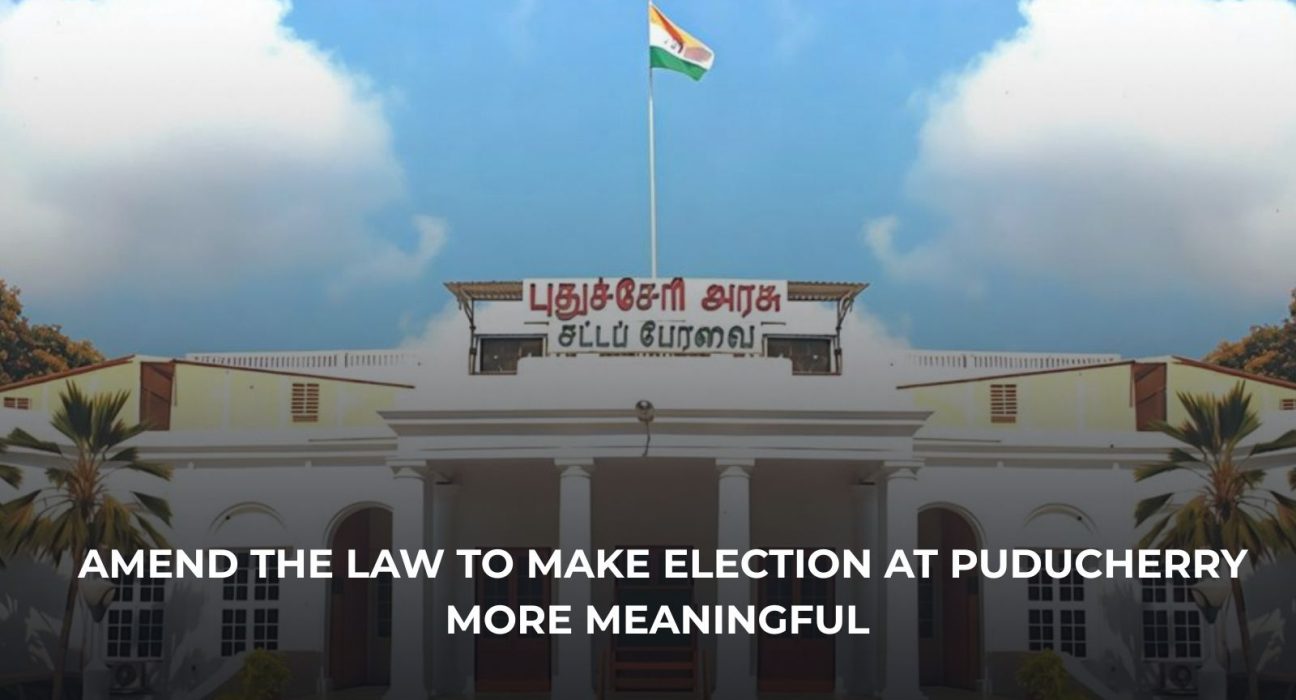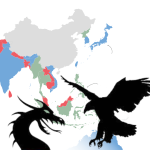In about a year, the people of Puducherry would be voting in the election to their territorial assembly. Unfortunately, their small population would keep their peculiar Constitutional problems away from deliberations across the media. After the Council of Ministers headed by the Chief Minister resigned in February 2021, elections and democracy at Puducherry had been reduced to a laughing stock because the confidence motion initiated by the then Chief minister Narayanasamy was almost defeated at the instance of three MLAs nominated by the Union Government who helped the opposition outnumber MLAs from the party elected by the people.
In a parliamentary democracy, immediately after elections to the legislative assembly, the Governor/Lieutenant Governor (L-G) invites the leader of the single largest party (or political coalition) to form the Government. For example, in the election to ‘30-seat’ Puducherry legislative assembly, if ‘Party – A’ wins 16 seats & ‘Party-B’ wins 14 seats, the L-G invites leader of ‘Party-A’ to form the Government, respecting people’s mandate.
The Ambiguity leading to Controversy
It is important to note that Section 3 of the Government of Union Territories Act, 1963 enables the Union Government to nominate 3 members to the Puducherry Legislative Assembly. In the example above, if ‘Party B’ is the ruling party in the Union Government, and 3 MLAs are nominated by the Union Government from the party; can the Puducherry Government formed by ‘Party-A’ with 16 elected MLAs be toppled with the help of 3 MLAs nominated from ‘Party B’? Shockingly, the relevant laws do not distinguish between power/responsibilities of the elected MLAs and the nominated MLAs viz., their voting rights also.
Arbitrary nominations during the Congress led Government
In May 2016, the Congress party (15 seats) formed the Government at Puducherry with the help of its ally DMK (2 seats). In June 2017, the Union Government nominated three persons from the BJP party without consulting the territorial Government at Puducherry and the L-G administered oath of their office. The BJP had drawn a blank in the 2016 elections. While this being the case, the three nominated members wrote to the Assembly Secretary that they constitute the BJP legislature party and that they had chosen one of them as their leader in the assembly. The speaker refused to recognize them as members of the house stating that they had been nominated by an incompetent authority in violation of the provisions of the Constitution and the Government of Union Territories Act, and that merely because they were administered oath by the L-G, they cannot be recognized as members of the assembly.
This tiff eventually ended up for adjudication before the Madras High Court. [K. Lakshmi Narayanan Vs the Union of India, W.P. Nos. 16275, 18788, 29591-29592/2017] One of the petitioners contended that the provision of the UT Act enabling nomination of MLAs was unconstitutional on the ground that it provided unfettered discretion on the Union Government without laying down any guidelines on how such discretion is to be exercised. Another petitioner challenged the nomination of MLAs on the ground that the discretion could be exercised by the Union Government only on receipt of a recommendation from the Puducherry cabinet. The nominated MLAs challenged the order of the speaker on the ground that they had been nominated by the competent authority i.e., the Union Government and that there was no constitutional convention requiring receipt of recommendation by the Puducherry cabinet while making the nomination.
Why previous Nominations were not an issue ?
The Court observed that MLAs had been nominated to Puducherry legislative assembly only on 6 occasions earlier and problems never arose since: a) there was no dispute between the parties in power in the Union Government and the territorial administration; b) on earlier occasions the nominated MLAs belonged to political parties which already had a legislature party in the assembly and it was only in the present case that BJP did not have a legislature party since they could not win any seat in the 2016 election.
Recommendations
The Court ultimately went on to uphold the nomination of the MLAs and set aside the speaker’s order noting that it was a violation of the Constitutional mandate. However, the Court pointed at the legal lacunae and made the following recommendations:
“(i) A clear and unambiguous procedure has to be laid down for nomination of MLAs to the Puducherry Legislative Assembly, with particular clarity about where it should emanate from and how it should be carried to its logical end.
(ii) It has to be laid down with specificity as to who / which office will actually exercise the powers of nomination under Section 3(3) of the UT Act eliminating the need to resort to inferential process which has become necessary in the instant case.
(iii) Qualifications, qualities and credentials which will go to make a ‘well rounded personality’ for qualifying for being nominated as an MLA have to be set out. To be noted, we are not on ‘eligibility’ or ‘educational qualification’. We are on ‘suitability‘.
(iv) If the nominated MLA belongs to a political party on the date of nomination, it should be made clear that he shall become part of the legislature party of that political party. If there is no legislature party in the house on the date of nomination, the nominated MLA/s shall constitute the legislature party of that political party.”
Controversy continued even during NR-BJP coalition
After the 2021 assembly elections, the coalition of NR Congress (10 seats) and the BJP (6 seats) formed the Government and Chief Minister Rangasamy (NR Congress) took oath of office. Before the rest of the cabinet or the MLAs could assume office, the CM was infected with COVID and he was admitted in the hospital. While he was still at the hospital, the Union Government nominated three members from the BJP party to the territorial assembly unilaterally increasing their strength from 6 to 9 and this imbroglio culminated into a writ petition before the Madras High Court again. [G.A. Jagaannathan Vs The Union of India, W.P. No. 12052/2021]. This time around, when the petition was dismissed citing that no time limit was prescribed for nomination of MLAs, the Court observed that:
“Undue haste has been ascribed to the nomination, seeing as the Chief Minister had tested positive for COVID-19 and had been admitted in the hospital and the Legislative Assembly and Cabinet had not been sworn in/constituted at the time when the nominations were made. This is more a challenge to propriety rather than one of law.”
Parliament should amend the law by disarming nominated MLAs at Puducherry from voting rights similar to the nominated MPs in the Parliament to make elections more meaningful.




